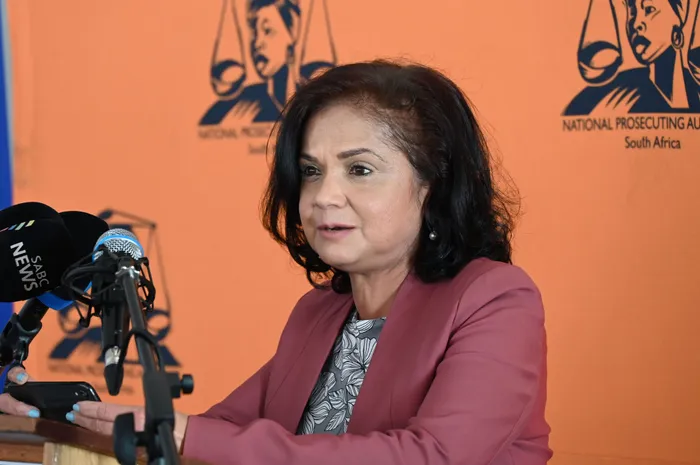
National Director of Public Prosecutions (NDPP), Shamila Batohi detailes how charges in the Cato Manor racketeering case were centralised in KwaZulu-Natal, ensuring coordination across DPPs and a complete understanding of the enterprise’s criminal activities.
Image: Ayanda Ndamane/Independent Newspapers
National Director of Public Prosecutions (NDPP) Shamila Batohi has outlined the process by which charges in the Cato Manor racketeering case were centralised in KwaZulu-Natal.
She highlighted the coordination between various Directorates of Public Prosecutions (DPPs) and explained the rationale for consolidating multiple dockets into a single trial.
Evidence, led by Advocate David Mohlamoyane, focused on applications for centralisation under section 111 of the Criminal Procedure Act, 51 of 1977.
Testifying before the Nkabinde inquiry, Batohi explained that centralisation occurs when offences are committed across different jurisdictions, and the relevant DPPs agree that the case is better heard in a single forum, typically where most offences occurred.
She referred to a memorandum dated 15 August 2012 from Advocate Andrew Chauke to Acting NDPP Advocate Nomgcobo Njiba, which applied for the centralisation of charges against Major General Johan Booysen, Chauke, and several others.
The memorandum noted that while most racketeering offences occurred in KwaZulu-Natal, one incident, the killing of Sifiso Ndimande, took place in Rustenburg, North West Province.
“Most of the predicate offences in pursuit of the aims of the enterprise were committed in KwaZulu-Natal,” Batohi said, “but in Rustenburg, officers Gonasagren Padayachee, Paul Mostert, Neville Eva, who were part of the Serious Violent Crime Unit in Durban, traveled to Rustenburg and killed Sifiso Ndimande.
''This killing was linked to other violent offences, including the murders of Magojela Timson Ndimande and Sibusiso Tembe, and was part of a pattern connected to the former police informer, Nkosi Wellington Zondi,'' she said.
She highlighted that the memorandum recommended that all related offences be tried together in KwaZulu-Natal for efficiency, preservation of similar fact evidence, and a complete understanding of the enterprise’s modus operandi.
Batohi also read into the record the detailed charges listed in the memorandum, including housebreaking with intent to commit murder, contraventions of the Firearms Control Act, and defeating or obstructing the course of justice.
She stressed that the memorandum justified centralisation “to avoid prejudicing the accused, witnesses, and the administration of justice.”
Further evidence included a draft directive signed by Acting NDPP Advocate Njiba on 17 August 2012, confirming the centralisation of the charges in the KwaZulu-Natal High Court.
Internal memoranda, including one from Advocate Anthony Mosing dated 27 August 2012, confirmed that the Rustenburg offences formed part of the KwaZulu-Natal racketeering enterprise.
Consent for centralisation was subsequently provided by the North West DPP, Advocate J.J. Smit SC, who agreed that certain counts could be consolidated with racketeering charges in KwaZulu-Natal.
Batohi noted that authorisations were also granted under section 2.4 of the Prevention of Organised Crime Act (POCA), 121 of 1998, covering both participation in the enterprise and management contraventions, and applying to multiple accused between 2008 and 2011.
She explained that although some offences occurred outside KwaZulu-Natal, the process involved consultation and consent from all relevant DPPs, ensuring proper jurisdiction and coordination.
“Centralisation ensures that the modus operandi of the enterprise, the chain of killings, and management of the group are fully understood by the court,” Batohi said.
She emphasized that the process “preserved the integrity of the prosecution and maximised the efficiency of the justice system.”
She also added, “The application and subsequent consent letters are a clear indication of how complex multi-jurisdictional cases are managed within the prosecutorial framework, ensuring efficiency and a holistic presentation of the enterprise’s activities.”
hopentanzi@iol.co.za
IOL Politics
Related Topics: